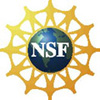 Report
of the NSF Workshop
Report
of the NSF Workshop
on Force Transduction in Biology
July 24–26, 2000 • Arlington, VA
| Home | |
| Summary | |
| Table of Contents | |
| I. Overview | |
| II. Summary of Invited Talks | |
| A. Monday, July 24 |
|
| B. Tuesday, July 25 |
|
| C. Wednesday, July 26 |
|
| III. Conclusions and Recommendations | |
| Conference Participants | |
III. Conclusions and Recommendations
The problems in force transduction in biology, even the 'small' problems, are of such complexity that many different techniques and approaches are needed for progress. The challenge is assembling the right set of skills for a particular problem. However, once this is done, considerable progress can be expected. The NSF can play a very significant role in fostering the sort of interdisciplinary research to address these important problems.
The following comments summarize the major conclusions of the Workshop:
-
Problems in the field of biological force transduction are not just a set of biochemical issues, but span the molecular to the macroscopic; thus, new engineering tools and models are needed.
-
The study of force transduction has significant potential for development of new biomaterials, as mechanisms for force transduction are better understood.
-
The mechanical issues in force transduction bear directly on issues inherent in the protein folding problem.
-
The relation between the mechanical stress or shear state of a molecule and its functionality is still very poorly understood and represents an important challenge, and a great opportunity.
-
The mechanical function of the cytoskeleton remains poorly understood and represents a significant challenge with a large reward once better understood.
-
The complexity of the problems involved in force transduction demand extensive interdisciplinary interaction and will require the active collaborations among chemists, biologists, physical scientists and engineers.
-
More collaboration between and theory and experiment is needed. Theoretical efforts lag experiment for the most part owing to issues of complexity. This represents a significant opportunity for new research.
-
The "materials and mechanical" properties of biomolecules are major determinants in their biological function. This represents a new frontier for research, in which the NSF is ideally poised to make a major contribution.
-
Because of the spread in possible impacts of research on biological force transduction, from fundamental science to clinical benefits, major opportunity exists for coordination and cooperation between NSF and NIH in jointly funding research programs.
NSF CONTACTS:
| Hollis Wickman Division of Materials Research hwickman@nsf.gov |
Soo-Siang Lim Division of Integrative Biology and Neuroscience Slim@nsf.gov |
| Eva I. Barak Division of Molecular and Cellular Biology ebarak@nsf.gov |
Frederick Heineken Bioengineering and Environmental Systems Engineering Division Fheineke@nsf.gov |
| Kamal Shukla Division of Molecular and Cellular Biology kshukla@nsf.gov |
Denise Caldwell Physics Division Dcaldwell@nsf.gov |
ABOUT THE NATIONAL SCIENCE FOUNDATION
The National Science Foundation (NSF) funds research and education in most fields of science and engineering. Grantees are wholly responsible for conducting their project activities and preparing the results for publication. Thus, the Foundation does not assume responsibility for such findings or their interpretation.
NSF welcomes proposals from all qualified scientists, engineers and educators. The Foundation strongly encourages women, minorities, and persons with disabilities to compete fully in its programs. In accordance with federal statutes, regulations, and NSF policies, no person on grounds of race, color, age, sex, national origin, or disability shall be excluded from participation in, be denied the benefits of, or be subjected to discrimination under any program or activity receiving financial assistance from NSF (unless otherwise specified in the eligibility requirements for a particular program).
Facilitation Awards for Scientists and Engineers with Disabilities (FASED) provide funding for special assistance or equipment to enable persons with disabilities (investigators and other staff, including student research assistants) to work on NSF-supported projects. See the program announcement or contact the program coordinator at (703) 292-6865.
The National Science Foundation has Telephonic Device for the Deaf (TDD) and Federal Relay Service (FRS) capabilities that enable individuals with hearing impairments to communicate with the Foundation regarding NSF programs, employment, or general information. TDD may be accessed at (703) 292-5090 or through FRS on 1-800-877-8339.
The National Science Foundation is committed to making all of the information we publish easy to understand. If you have a suggestion about how to improve the clarity of this document or other NSF-published materials, please contact us at plainlanguage@nsf.gov.